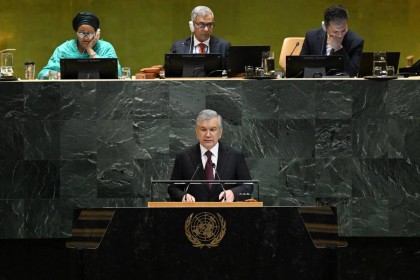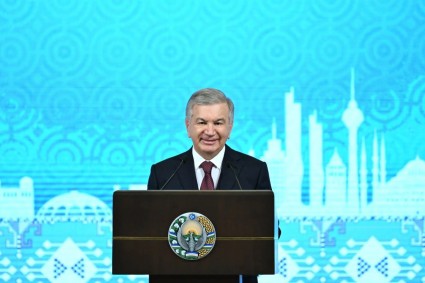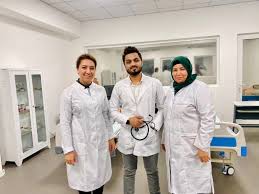The president Shavkat Mirziyoyev delivered an address at the general debate of the 80th session of the UN General Assembly in New York on Tuesday. Highlights:
“Uzbekistan advocates for the transformation and expansion of the UN Security Council to more effectively address modern challenges and threats, as well as protect the interests of developing countries”.
“This anniversary meeting is taking place in a rapidly changing and complicated global environment, and this requires a new perspective and approach to the activities and future of the United Nations.”
"Today, we are witnessing a weakening of the role of international institutions, a rise in contradictions, conflicts, and wars in the world, as well as a sharp increase in technological and social inequality, and a worsening of economic and humanitarian crises. All of this is creating an entirely new, alarming geopolitical reality,".
"We fully support the UN-80 initiatives and reiterate our firm commitment to the Pact for the Future".
"The new Uzbekistan advocates solidarity, open dialogue, and close cooperation with all countries of the world".
"We are ready to contribute to strengthening dialogue among peoples, cultures, and civilizations, and to achieving the goals of humanity".
“Discussions of global and regional security and sustainable development are impossible without mentioning Afghanistan.”
"To support the Afghan people's aspirations for a peaceful and tranquil life, we must unite the efforts of the international community, and it is extremely important to prevent the isolation of this country."
"We plan to implement major economic and infrastructure projects in this country. We propose adopting a separate UN resolution on the development of international transport and energy corridors through this country".
“The rapidly worsening humanitarian crisis in the Gaza Strip cannot be ignored. "We call for an end to military action and the continuation of political negotiations".
"We resolutely support the implementation of the 'two states for two peoples' principle in accordance with UN resolutions".
"The situation around Ukraine is a source of serious concern to all of us. We welcome the start of a high-level dialogue on resolving it through diplomatic means".
"Effective work is underway in Central Asia to implement the Global Counter-Terrorism Strategy. A Regional Expert Council on Rehabilitation and Reintegration has been set up in cooperation with the UN Office of Counter-Terrorism. Uzbekistan proposes transforming this council into an International Competence Center. It will serve as an important platform for sharing experiences on the adaptation of persons returned from problem areas to civilian life".
“We are ready to create all the necessary conditions for the opening of a regional office of the UN Office of Counter-Terrorism in Uzbekistan.”
“Uzbekistan proposes adopting a UN General Assembly resolution supporting the efforts of Central Asian countries to deepen regional partnership and economic integration.”
"Eight years ago, from this high tribune, we declared our firm resolve to transform Central Asia into a space of peace, good-neighborliness, and partnership. And today, we can state with deep satisfaction: we have achieved this strategic goal. The era of closed borders, unresolved disputes, and conflicts is a thing of the past".
“In recent years, trade, investment, and transportation volumes in the region have increased fivefold. Joint investment funds, border trade and industrial cooperation zones are being established, and major infrastructure projects are being implemented”.
“The Central Asia Summit is an effective mechanism for deepening regional integration a shared achievement. I can confidently say that the process of forming a New Central Asia has begun today. Thanks to its cohesion, stability, and growing regional identity, it is increasingly taking a firm place in the system of international relations as an independent entity".
"To achieve these goals, we intend to prioritize expanding mutually beneficial ties with all our foreign partners".
“I propose implementing a number of new projects and programs in the Central Asian region in conjunction with UN agencies. Specifically, he proposed holding an international forum under the auspices of ECOSOC (the UN Economic and Social Council) and UNCTAD (the UN Conference on Trade and Development) dedicated to the economic development of Central Asian states; establishing, jointly with UNIDO (the United Nations Industrial Development Organization), a regional hub for green technologies in industry; adopt programs for the rational use of water resources in the region, the formation of "green" space and ensuring demographic sustainability.”
"The future, the fate, and well-being of the world are in the hands of the younger generation. Our urgent task is to instill in the minds of young people the noble ideas of peace, humanism, friendship, mutual trust, and respect".
"We are consistently implementing a policy of tolerance in our society. At the same time, we will actively continue the in-depth study and widespread popularization of the ideas of enlightened Islam throughout the world".
“Uzbekistan is consistently continuing to implement "the policy of building a democratic, legal, social, and secular state—the New Uzbekistan."
"Our main goal is to fundamentally change the lives of every family, every citizen living in our country, and to ensure human interests, dignity, and well-being".
“The reduction in poverty, efforts to reform education, science, and healthcare, and the development of green energy in healthcare.”
"Gender policy is an important area. We intend to further enhance the role of women in the country's public, political, and business life. We advocate for the regular holding of the Asian Women's Forum across our vast region, turning it into a permanent platform".
“It is important to close the gap between countries in digital development and the use of artificial intelligence.”
“I propose creating an International Cooperation Mechanism for the free exchange of practical solutions and artificial intelligence models in healthcare, education, and culture.”















